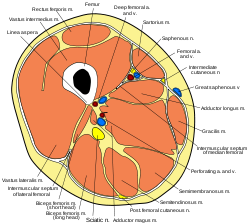The deep femoral artery also known as the deep artery of the thigh, or profunda femoris artery, is a large branch of the femoral artery. It travels more deeply ("profoundly") than the rest of the femoral artery. It gives rise to the lateral circumflex femoral artery and medial circumflex femoral artery, and the perforating arteries, terminating within the thigh.
| Deep femoral artery | |
|---|---|
 Cross-section through the middle of the right thigh. | |
| Details | |
| Source | Femoral artery |
| Branches | Lateral femoral circumflex Medial femoral circumflex Perforating |
| Vein | Deep femoral vein |
| Identifiers | |
| Latin | arteria profunda femoris |
| TA98 | A12.2.16.020 |
| TA2 | 4685 |
| FMA | 20741 |
| Anatomical terminology | |
Structure
editOrigin
editThe deep femoral artery branches off the posterolateral side of the femoral artery soon after its origin.[1]
Course
editIt travels down the thigh closer to the femur than the femoral artery. It runs between the pectineus muscle and the adductor longus muscle. It runs on the posterior side of adductor longus muscle.[1] It pierces the adductor magnus muscle, and may be known as the fourth perforating artery as it continues.[1] The deep femoral artery does not leave the thigh;[citation needed] terminating as perforating tissue branches within the thigh.[2]
Branches
editThe deep femoral artery gives off the following branches:
- Lateral circumflex femoral artery.[1][2]
- Medial circumflex femoral artery.[1][2]
- 3 perforating arteries that perforate the adductor magnus muscle to the posterior and medial compartments of the thigh to connect with the branches of the popliteal artery behind the knee.[citation needed] The perforating arteries arise in the anterior compartment of thigh. The terminal continuation of the deep femoral artery may be regarded as the fourth perforating artery.[3]
Distribution
editThe deep femoral artery is the main supply of oxygenated blood to the thigh.[1]
The medial circumflex femoral artery is distributes to the adductor group (adductor longus, magnus, and brevis), gracilis, and pectineus. It also supplies the femoral head and neck.[2]
The lateral circumflex femoral artery supplies muscles of the knee extensor group (vastus lateralis, vastus intermedius, and rectus femoris).[2]
The perforating arteries supply the hamstring muscles (semitendinosus, semimembranosus, and biceps femoris).[2]
Additional images
edit-
Deep femoral artery
See also
editReferences
editThis article incorporates text in the public domain from page 629 of the 20th edition of Gray's Anatomy (1918)
- ^ a b c d e f Ginzburg, Enrique; Chong, Chee Kiong; Rich, Norman M. (2008-01-01), Asensio, JUAN A.; Trunkey, DONALD D. (eds.), "Vascular Anatomy of the Extremities", Current Therapy of Trauma and Surgical Critical Care, Philadelphia: Mosby, pp. 467–472, doi:10.1016/b978-0-323-04418-9.50066-7, ISBN 978-0-323-04418-9
- ^ a b c d e f Swift, Hilary; Bordoni, Bruno (2022), "Anatomy, Bony Pelvis and Lower Limb, Femoral Artery", StatPearls, Treasure Island (FL): StatPearls Publishing, PMID 30855850, retrieved 2023-01-11
- ^ Moore, Keith L.; Dalley, Arthur F.; Agur, Anne M. R. (2018). Clinically Oriented Anatomy (8th ed.). Wolters Kluwer. p. 735. ISBN 978-1-4963-4721-3.
External links
edit- Profunda femoris deep femoral artery at the Duke University Health System's Orthopedics program
- Anatomy figure: 12:04-03 at Human Anatomy Online, SUNY Downstate Medical Center - "Arteries of the lower extremity shown in association with major landmarks."
- Cross section image: pelvis/pelvis-e12-15—Plastination Laboratory at the Medical University of Vienna
- MedEd at Loyola grossanatomy/dissector/labs/le/ant_th_leg/main.html
- antthigh at The Anatomy Lesson by Wesley Norman (Georgetown University) (femoralart)